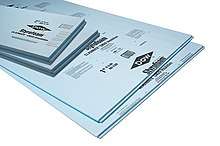Styrofoam
Styrofoam is a trademarked brand of closed-cell extruded polystyrene foam (XPS), commonly called "Blue Board", manufactured as foam continuous building insulation board used in walls, roofs, and foundations as thermal insulation and water barrier. This material is light blue in color and is owned and manufactured by The Dow Chemical Company.[1]

In the United States and Canada, the colloquial use of the word styrofoam refers to another material that is usually white in color and made of expanded (not extruded) polystyrene foam (EPS). It is often used in food containers, coffee cups, and as cushioning material in packaging.[1] The trademarked term is used generically although it is a different material from the extruded polystyrene used for Styrofoam insulation.
The Styrofoam brand polystyrene foam, which is used for craft applications, can be identified by its roughness and the "crunch" it makes when cut. Additionally, it is moderately soluble in many organic solvents, cyanoacrylate, and the propellants and solvents of spray paint.
History
In 1947,[2] researchers in Dow's Chemical Physics Lab found a way to make foamed polystyrene. Led by Ray McIntire, they rediscovered a method first used by Swedish inventor Carl Georg Munters.[3] Dow acquired exclusive rights to use Munters' patents and found ways to make large quantities of extruded polystyrene as a closed cell foam that resists moisture.
Uses
Styrofoam has a variety of uses. Dow produces Styrofoam building materials, including varieties of building insulation sheathing and pipe insulation. The claimed R-value of Styrofoam insulation is five per inch.[4]
Styrofoam can be used under roads and other structures to prevent soil disturbances due to freezing and thawing.[5][6]
Styrofoam is composed of 98% air, making it lightweight and buoyant.[7]
Dow also produces Styrofoam as structural insulated panels for use by florists and in craft products.[8] Dow insulation Styrofoam has a distinctive blue color; Styrofoam for craft applications is available in white and green.
Environmental effects
The EPA and International Agency for Research on Cancer reported limited evidence that styrene is carcinogenic for humans and experimental animals, meaning that there is a positive association between exposure and cancer and that causality is credible, but that other explanations cannot be confidently excluded.[9][10]
See also
References
- Dow Chemical Company Styrofoam page
- "Patent US 2450436 A. Manufacture of cellular thermoplastic products".
- Boundy, Ray H.; Amos, J. Lawrence (1991). A History of the Dow Chemical Physics Lab. New York: Marcel Dekker, Inc. pp. 117–128. ISBN 0-8247-8097-3.
- Dow Announces New Technology for STYROFOAM Insulation
- "Geotechnical applications of Styrofoam". Dow Chemical. Retrieved 2009-10-28.
- "Engineering considerations when building on permafrost". Retrieved 2007-08-30.
- "What is the Difference between EPS Polystyrene and (styrofoam)?".
- "STYROFOAM Brand Foam Crafts". Retrieved 2010-12-31.
- "(Styrene) Fact Sheet: Support Document (CAS No. 100-42-5)" (PDF). EPA. December 1994. Archived from the original (PDF) on 24 September 2015. Retrieved 8 January 2020.
- "STYRENE (Group 2B)". INCHEM. 2002. Retrieved 8 January 2020.